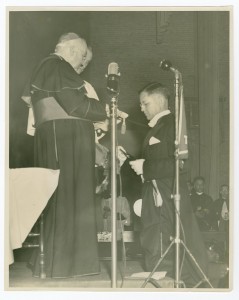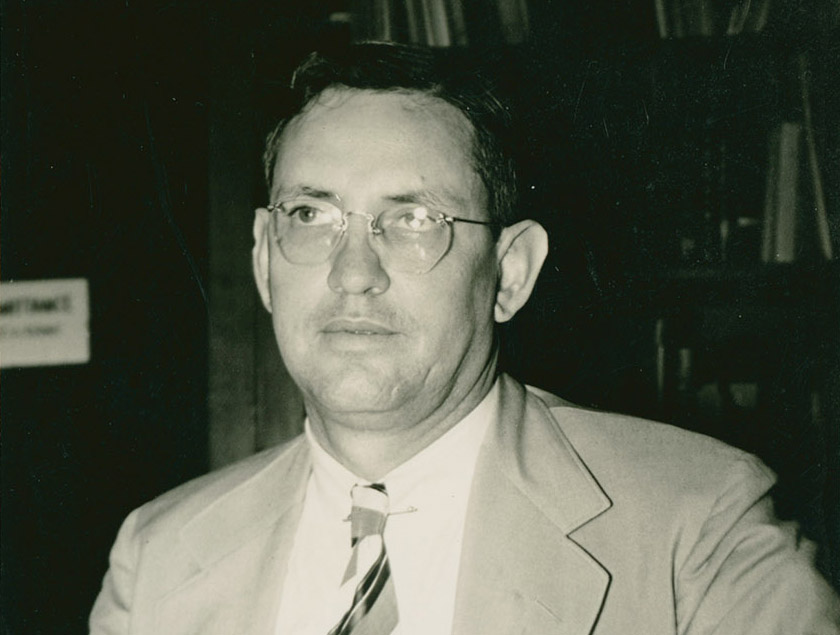Historian, archivist, educator Carlos E. Castañeda was born November 11, 1896, in Camargo, Tamaulipas, Mexico. His father was a professor of French and government at the College of San Juan in Matamoros, but the family moved to Brownsville around 1910. Castañeda’s parents both died before he was 15, leaving him with 3 sisters and 3 brothers.
Though he began his college career as an engineering major, Castañeda switched to his major to history (under the influence of E.C. Barker), and graduated with a BA from The University of Texas in 1921, having been elected to Phi Beta Kappa. He was married in 1922, and his first daughter, Gloria, was born in 1923, the same year that he obtained his MA from The University of Texas and began teaching Spanish for the College of William and Mary in Virginia.

In 1927, Castañeda was asked to return to The University of Texas, to take control of the newly acquired Genaro García collection, which served as the foundation for Latin American collections — and specifically, the Benson Latin American Collection — at UT. While acting as librarian for this collection, Castañeda began work on his PhD, producing more articles on the early history of Texas. Castañeda also collaborated with Texas State Library archivist Winnie Allen to launch the Mexican Photo Print Company, in an effort to recover copies of documents he had discovered in Mexico, a project that faced an unfortunate end with the advent of the Great Depression.
Castañeda completed his doctorate in 1932, his dissertation being a translation of the famous Morfi’s History of Texas. He re-discovered the text — at the time believed lost — while searching through the records of a Fransiscan monastery. Later that year, Castañeda’s second daughter, Consuela, was born.
Castañeda did not begin his career as a full professor for The University of Texas until 1940, after some protracted debate in the 1930s concerning his salary and teaching responsibilities (Castañeda felt that his salary had been reduced because of his ethnicity). It was these issues that led to his leaving in 1933 to become the Superintendent of the San Felipe School District in Del Rio, Texas, where he met with resistance from white families due to his ethnicity. He remained in that position for only a year.

After returning to The University of Texas for the 1935 school year, Castañeda resumed his career as a professor, and continued work on Our Catholic Heritage in Texas, a massive seven-volume life-spanning work on the early history of Texas, the last volume of which was not published until just prior to Castañeda’s death. Shortly after his return to the university, Castañeda was knighted by the Catholic Church as a Knight of the Holy Sepulchre, and in 1951 became a Knight Commander in the Order of Isabel the Catholic of Spain. These honors were granted on the basis of Castañeda’s long-time work with the Catholic community and Catholic history more generally.
Being concerned with the plight of minorities in Texas, Castañeda took another leave of absence in 1943 to work for the Fair Employment Practice Commission (FEPC), an agency that was concerned with helping minorities to obtain the same working conditions and jobs that whites were granted in the 1940s. Though the commission ended prematurely with the onset of World War II, Castañeda continued to actively work against discrimination, and became involved with the Pan American Union, and on its behalf, gave an internationally broadcast radio address in 1948.
In the 1950s Castañeda’s health failed, and he suffered three heart attacks during the decade, severely limiting his ability to write, teach and stay active in his many causes. The author of twelve books and over eighty articles, and recipient of many honors, Castañeda died on April 3, 1958, at the age of 62.
Along with first African American faculty member at The University of Texas at Austin Dr. Ervin Perry (engineering), Castañeda’s legacy was recognized in 1974 with the approval by the University of Texas Board of Regents to name the university’s new central library in his honor. The Perry-Castañeda Library opened in 1977, and remains the flagship library at the university to the current day.
The Carlos E. Castañeda Papers feature includes articles, speeches and drafts of books, notably Our Catholic Heritage in Texas (commissioned by the Knights of Columbus) and Castañeda’s translation of Morfi’s, History of Texas, along with transcriptions, translations and notes. The collection also documents Castañeda’s involvement with The University of Texas — including records of his faculty appointment and restricted student records —the Catholic Church and his international activities and various projects he took on over the years. Materials from his time in Del Rio, his service with FEPC, his work in many voluntary organizations, his teaching and departmental activities and his library and acquisitions work reflect the extent of his professional activities. The papers also feature a collection of historical documents dating from the late 15th century to the early 20th century, as well as a large selection of photographs, 8mm movies, phonodiscs, maps and book illustrations.
Benson staff are hosting a workshop on tracking relationships in research with network visualization and analysis tools using the Castañeda Papers on Wednesday, October 25. More information here.

